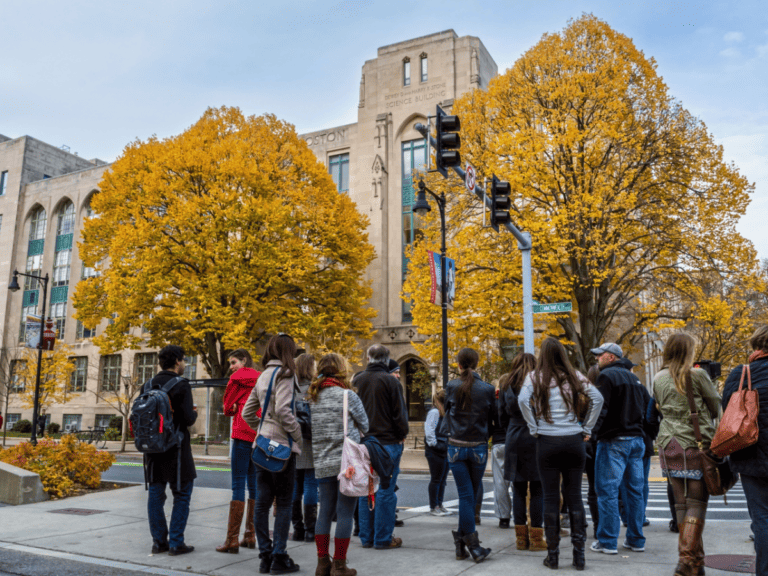College Information Sessions Guide
What is a college information session? What happens during the event? How do you schedule one? Will it help increase your chances of getting an offer to matriculate at your dream school?
Other than campus tours, many colleges and universities also offer what’s referred to as college information sessions where prospective applicants get to learn a lot of things about the postsecondary institutions of their choosing.
A college information session is an activity where prospective college students can learn more and ask questions about their chosen institution.
It is attended by college applicants and often by their parents. A college information session is facilitated by various college representatives.
A college information session is often coupled with a campus tour.
This means that other than providing detailed information about college- and college-related matters, a college information session is usually preceded by or carried out with a tour of the school grounds and its facilities.
Different people can administer a college information session, depending on the institution.
They usually are:
- Admissions officers
- Academic advisors
- Department faculty members
- Current students
A college information session can also come in a couple of forms:
- In-person
- Online or virtual
What Should You Expect During a College Information Session?
During a college information session, various representatives from the institution provide attendees with detailed information about the school and various college admissions-related matters.
They range anywhere from the application process, financial aid, academic programs, on-campus housing options to campus life.
Most college information sessions last for approximately an hour.
How long you will have to spend attending a college information session will depend on various factors, including whether or not the session is coupled with a campus tour and the number of attendees.
Typically, a college information session starts with college representatives designated to facilitate the event providing all kinds of information that can be valuable for prospective college applicants and students.
A college information session’s venue can also vary, such as in the admissions office, library or auditorium.
Students attending the college information session and their parents, too, can ask questions.
The question-and-answer portion usually happens after the facilitators of the activity have talked about everything they have to discuss, and the attendees are given the opportunity to ask questions that require more specific than general answers.
How Far in Advance Should You Schedule
Information sessions tend to fill up quickly given that they can be extremely helpful in the college search and admissions process.
As such, interested students are strongly advised to register for a college information session weeks or months in advance to ensure that they can be accommodated on their preferred days.
To schedule a college session, you can visit the website of the college of your choosing or get in touch with its admissions office to inquire about which college information session schedules are currently available.
With most colleges limiting the number of registrants, it can be very easy to run out of schedules to choose from.
It’s also worth noting that it’s not uncommon for some institutions to limit the number of guests a student attending can bring.
For instance, the University of Oklahoma says it will not be able to accommodate additional guests if a session is already full — as a matter of fact, some of its sessions for certain programs allow only a single guest.
What to Wear on a College Visit
Because you will be in the presence of college admissions officers and/or other college representatives, it’s a good idea to wear appropriate clothes such as blazers, button-down shirts, slacks, khakis, blouses, dress shirts and dresses.
Also going on a campus tour on the same day?
Opt for comfortable footwear.
Usually, the college administering the information session will give the registrants a checklist to bring with them to the event as well as important details such as where to park, who to invite, where to go and what to expect.
The following are some helpful tips for attending a college information session:
- Research the college, if you haven’t already, and familiarize yourself with its academic programs, campus culture, athletics, admissions requirements, support services, etc.
- Prepare questions whose answers you can’t seem to find on the college’s website or elsewhere on the internet — focus on those that will help you greatly in the college selection process.
- Take notes during the college information session, especially important details about the admissions process, financial aid matters and program you intend to enroll in.
- Network with other attendees and current college students to gain insights and perspectives, all of which can prove to be helpful in selecting and applying to colleges one way or the other.
- Get your hands on each brochure, pamphlet, flyer and business card you can find and use them at a later time when making a decision as to whether or not you should apply to the college.
How to Get the Most From an Info Session
To get the most out of a college information session, college-bound teens are encouraged to prepare questions to ask the facilitators, especially the kinds that are specific to their intended major as well as unique circumstances.
Taking a campus tour on the same day, if possible, is a great way to maximize the event.
Listening attentively is important during a college information session. After all, you’re there to learn more about the college, its admissions process and the program you are considering.
However, it also gives you the opportunity to obtain specific answers to questions tailor-made for you.
- What’s the difference between Early Decision I and II?
- What common mistakes do you see high school teeners make on their applications?
- How many first-year students are a part of the Greek community?
- Is there a co-op program available here?
- Do you have experiential learning opportunities?
- Are outside scholarships accepted?
To take full advantage of the trip to your top-choice college, it’s usually a good idea also to schedule a campus tour and, if available or allowed, an on-campus interview with an admissions officer or college advisor, too.
Can an Info Session Help With Admission to Harvard?
According to Harvard University itself, registration information it asks from those who are interested in attending a college information session will be used for planning only and will not have an impact on the admissions process.
Can a College Information Session Help to get into UPenn
Attending a college information session may help with admission to the University of Pennsylvania in that it allows prospective applicants to learn how best to prepare and apply to the Ivy League school.
Can an Info Session Help With Admission to Princeton?
Since Princeton University doesn’t consider demonstrated interest in the admissions process, attending a college information session will not help increase your chances of getting in if it’s to be used solely to exhibit your interest in attending.
Can a College Information Session Help With Admission to MIT?
Like many selective colleges, MIT doesn’t track demonstrated interest.
However, it invites prospective applicants to attend a college information session, even encouraging some who like to attend with up to 50 people to schedule a group tour.
Can a College Visit Help With Admission to Caltech?
Attending a college information session may help boost your admissions chances to Caltech because, according to the 7th best national university, as per US News, it will help you submit the strongest admissions application possible.
Will Attending Info Session Help With Admission to Johns Hopkins?
Since one of the things you will learn at a college information session at Johns Hopkins is crafting the strongest application that you possibly can, attending it may actually help you get into the highly selective institution.
Will Visiting UCLA Help With Admission Chances?
Any help in admissions chances that a college information session at UCLA can bring has nothing to do with demonstrated interest, which isn’t considered, and more on helping high schoolers improve the components of their applications.
Disclaimer: The views and opinions expressed in this article are those of the authors and do not necessarily represent those of the College Reality Check.

